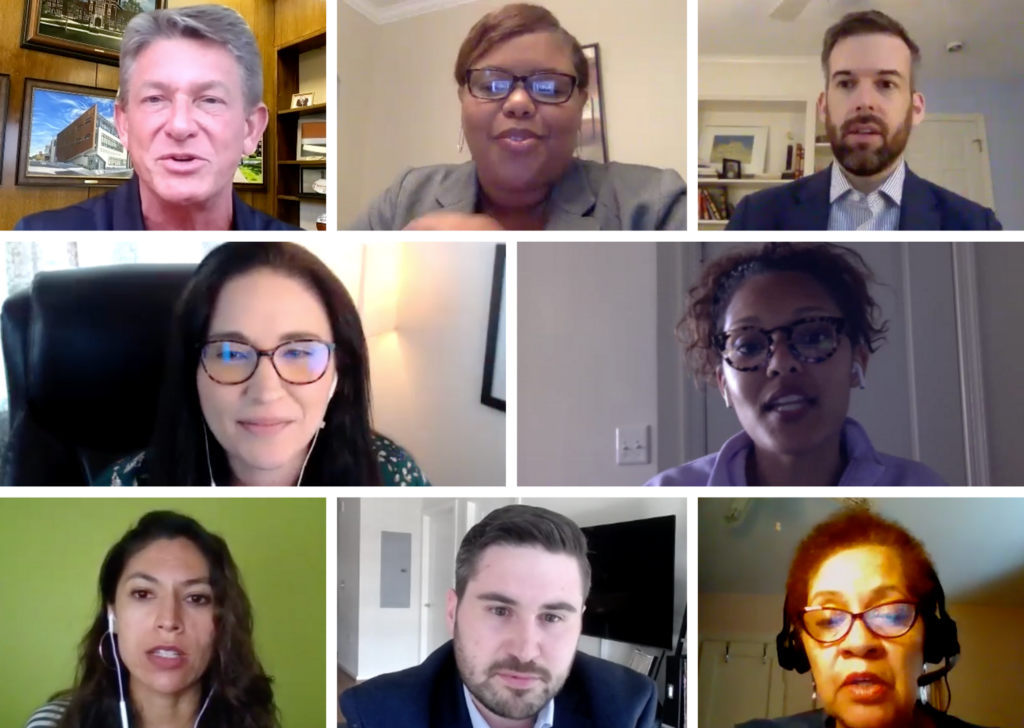
Completion of a certificate or degree in higher education is a key gateway to obtaining social and economic mobility. On average, individuals with postsecondary credentials have higher wages than those without, and more than 50 percent of in-demand occupations in Tennessee require some sort of postsecondary credential.
CTLI works to illuminate challenges and identify potential solutions to close equity gaps at the state, regional, and institutional levels of higher education policy. The first three sessions of the 2019-20 CTLI cohort were centered on increasing educational access and providing supports for student persistence. During their recent final session, members focused on policy discussions for improving higher education completion rates and developed individualized action plans for driving change in their home communities.
The first day of our virtual convening focused on designing policy initiatives in ways that better serve students from historically underserved groups, including students of color, first-generation college students, students from low-income backgrounds, and students from rural communities. Historically, our education systems have not sufficiently supported these student groups in their efforts to attain high-quality certificates and degrees, and improving and targeting resources and supports for completion and success is important. Across all institution types in Tennessee, Black and Latino students are less likely to complete a degree or certificate than White students. The system needs to change to close these gaps.
The group was welcomed by Scott Niswonger, founder and chairman of the Niswonger Foundation, and Dr. Nancy Dishner, president and CEO of the Niswonger Foundation. The pair shared how the foundation’s partnership with 14 counties and 19 local education agencies within Tennessee’s First Congressional District, along with 10 affiliate counties across the state, is helping address the specific challenges of rural education. Last year, 63.6 percent of high school graduates in northeast Tennessee went on to some postsecondary education — a remarkable 13-point increase from previous years.
Later, the group heard from leaders at the Tennessee Higher Education Commission, The Education Trust, and the American Council on Education as they discussed how colleges and universities can narrow equity gaps and support students in completing their degree in a reasonable amount of time.
Key takeaways included:
- Practices that work will vary based on context, so evaluating and allowing data to drive everything institutions do is crucial to consistent improvement. It is especially important that data being used to inform practice are disaggregated by both race and income.
- Pilot programs for student success initiatives are often given to established and wealthy institutions because they can show past successes, resulting in the institutions that really need it being left out.
- Our systems were not designed to support Black students. More than half of Black students who start at a community college leave without earning a credential (compared to 39 percent of all students).
- Policymakers should be cautious about guiding students to use their limited financial aid dollars on credentials that have not yet been proven to help students gain a high-quality entry into the workforce.
The group closed out the first day hearing from President Randy Boyd of the University of Tennessee System and Scott Jenkins, strategy director at the Lumina Foundation, who talked about the history and evolution of the Drive to 55 postsecondary attainment goal, strategies for making progress toward the goal, and the current challenges facing higher education in Tennessee.
The second and final day of the convening and closing out the program for this cohort of leaders included a policy discussion with Emilie Rafal from Credential Engine on developing frameworks for determining the value of credentials and making sure students are developing skills that will qualify them for high-demand jobs. Additionally, each cohort member developed an action plan tailored to the higher education values they hold and the specific policy levers available to them in their current roles. Many of the plans touched on common themes highlighted throughout the program: the importance of developing partnerships across the P-20 continuum, renewed urgency to address inequities that existed before the pandemic, and how to reimagine a more equitable system in the coming years.
Despite the challenges these education leaders are facing, their commitment to students couldn’t have been more clear. SCORE and The Hunt Institute look forward to supporting this CTLI cohort as they implement their plans, and we are excited to build on the success of this year’s program as we prepare to welcome a new cohort of leaders in Fall 2020.
Samantha Gutter is senior director of postsecondary impact at SCORE. Patrick Sims is director of policy and research at The Hunt Institute.
